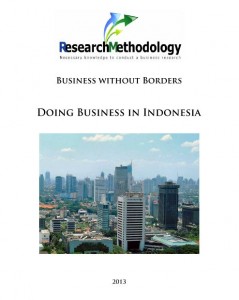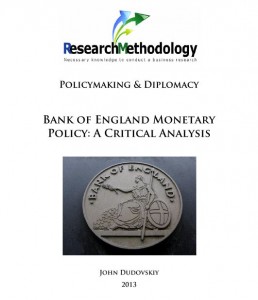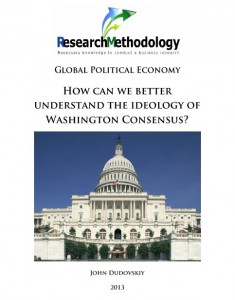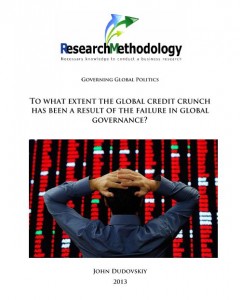Posts by John Dudovskiy

The report starts with the identification of gap in the knowledge about doing business in emerging markets in general, and Indonesia in particular. This is followed by providing recommendations to managers in relation to dealing with specific issues and practices they are likely to be faced with in Indonesia. The report is concluded by providing a summary of the key points of the research and mentioning the key points of advice. International market expansion opportunities for businesses enabled by intensive economic globalisation during the last several decades have increased the numbers of international assignment for managers at top levels. Importantly, “international managers need to have a clear view of where they want their firm to be in the future; they have to organise to implement their plans; they have to motivate those who work for them; and they have to develop appropriate control mechanisms” (Griffin, 2010, p.161). However, implementation of all of these tasks in practical levels is associated with a set of significant difficulties that relate to cross-cultural differences, family adjustment issues in a new country, language adaptation challenges and others. This report advises managers seeking to work in an emerging market on management practices in an international and cross-cultural context focusing on Indonesian consumer electronics market. The main reasons for the choice of Indonesia as an emerging market to be discussed in this report relates to the importance of Indonesia Investment Guarantee Fund – the best practice guarantee facility for investors and the potential possessed by Indonesia to become the next member of BRIC (Wagner, 2012, online) with positive implications on the performance of businesses operating in this country. 1. Introduction 1 2. Identification of Gaps in Knowledge 2 3. Recommendations Regarding Issues and Practices in Indonesia 4 3.1 Cross-Cultural Differences 4 3.1.1 National culture 4 3.1.2 Organisational…

Global forces impacting UK businesses include, but not limited to increasing scale of international trade, increasing levels of multiculturalism in UK organisations, increasing levels of inter-dependency of national economies and others. The impact of global forces on UK Business Organisations can be effectively analysed using PESTEL analysis where the abbreviation stands for political, economical, social, technological, ecological, and legal factors impacting businesses. The following table contains the application of PESTEL analysis in relation to businesses operating in the UK. Political The level of global political stability The level of bureaucracy in international affairs The extent of freedom of media Global trade control initiatives Threat of international terrorism Tariffs between the UK and other countries Global copyright, patent and intellectual property disputes Economical Impacts of intensifying economic globalisation Global economic crisis Sock market fluctuations Cost advantages possessed by emerging superpowers such as China, India etc. Impact of The World Bank and The World Trade Organisation Increasing importance of outsourcing and offshoring initiatives Social Changes in family values in global scale Changes in family patterns (same-sex marriages, single parents etc.) Increasing popularity of immigration and migration practices Increasing mobility between social classes Greater concern for minorities in society Technological Level of global technological infrastructure Industry-specific technological breakthroughs Regular emergence of innovative communication technologies Adoption of technology as competitive edge by increasing numbers of businesses Ecological Impacts of global warming tendencies Increasing levels of air and pollution Increasing level of sensitivity towards “green” problems among business stakeholders Activities and initiatives of global environmental organisations Legal Laws and regulations related to data protection Global data protection rules and regulations Increasing levels of “legal globalisation” Changes in cross-country employment and health and safety laws The case studies of Martin Lishman and Aquaco mentioned above represent a few cases where UK businesses benefit from…

International trade is the exchange of capital, products and services across borders. Advantages of international trade include greater utilisation of resources, importing products that can not be produced locally, and increasing the variety of choice to consumers. However, international trade may be associated with disadvantages as well such as loss of local jobs and high level of dependency on foreign markets. Significance of international trade to UK business organisations can be explained by referring to the concept of comparative advantage. According to the concept trade between two countries can be made in a mutually beneficial manner, if each country has comparative advantage to manufacture products to be traded. One of the leading English economists of the 19th century David Ricardo uses the cases of England and Portugal producing cloth and wine as it is presented in Table 2. According to Table 2, England possesses relative advantage in producing cloth as it less labour hours are required. Portugal, on the other hand, has relative advantage in wine production, because only 80 hours are required to produce wine as compared to 90 hours to produce cloth. Cloth Wine Ratio of price of wine to the price of cloth Ratio of price of cloth to the price of wine England 100 120 1.20 0.83 Portugal 90 80 0.88 1.12 Illustration of the concept of comparative advantage Source: Hunt and Lautzenheizer (2011) In other words, England can produce each unit of cloth for lower prices compared to wine, while for Portugal it is cheaper to produce each unit of wine than producing each unit of cloth. Accordingly, both England and Portugal can consumer maximum amounts of cloth and wine if they focus on producing products within their relative advantage, and engage in international trade. Impact of international trade to UK businesses can be illustrated…

This paper represents a policy paper that contains a critical analysis of Bank of England monetary policy. The paper starts with reflecting upon the main principles of Monetary Policy Committee (MPC) practices. This is followed by discussions about the role of The Bank of England policies in maintaining macroeconomic stability in UK with the particular focus on MPC impact on the level of inflation, prices of assets, the level of exchange rate and unemployment rate. Moreover, the paper reflects upon a range of inefficiencies associated with MPC monetary policy practices and it also provides recommendations in terms of improving Bank of England monetary policy practices. The Bank of England was founded in 1694, it was nationalised in 1946, and gained its independence in 1997. The Bank is “committed to promoting and maintaining monetary and financial stability as its contribution to a healthy economy” (About the Bank, online, 2013) The Bank of England has two major purposes: monetary stability and financial stability. The Bank “acts as the government’s bank, regulates the money stock growth rate and the availability of credit, and serves as a banker’s bank for commercial banks, making loans and holding deposits” (Allen, 2009, p.29). Monetary Policy Committee (MPC) of The Bank of England deals with issues related to the monetary policy in UK. The members of MPC are appointed by The UK HM Treasury that also sets the inflation target. Monetary policy is best defined as “the actions of a central bank, currency board or other regulatory committee that determine the size and rate of growth of the money supply, which in turn affects interest rates” (Investopedia, 2013). Four main characteristics of monetary policy have been specified as goals, instruments, discretion, and intermediate targets (LaBonte and Makinen, 2006). Instruments are policy options available to central banks to control…

Resource allocation plays an integral role in facilitation of a national economy in any country. Economic systems can be centrally-panned, free, and mixed and economic systems have a direct impact on the nature of resource allocation. UK has a free market economy, and accordingly resource allocation in the UK is facilitated purely according to the forces of supply and demand. In centrally-planned economies, on the contrary, such as former USSR “resource allocation plans and decisions are made by central government and then promulgated through government agencies” (Folsom and Boulware, 2004, p.58). In mixed economic systems, such as in China and present state of former USSR members, there are elements of both, free market and centrally-planned economies to varying proportions. The extent of presence free market and centrally planned elements in each mixed economy depends on a range of factors such as political agenda, the level of corruption, the levels of dependency on exports and imports etc. The effectiveness of free market economy such as in the UK has been traditionally perceived to be greater compared to alternative types of economies in terms effective resource allocation. However, global economic and financial crisis of 2008-2010 and its continuing implications have shed a light on inefficiencies associated with free market economy. Fiscal policy is a type of government economic policies that affect macroeconomic situation in the country. Impact of fiscal policy on businesses is evident and straightforward and this impact is facilitated through taxation, and the levels of government spending. Monetary policy is can be defined as government economic policy to control the supply of money through interest rates. In the UK the monetary policy is conducted by The Bank of England, whereas in Russia the Central Bank of Russia is responsible for monetary policy. The importance of adequate fiscal and monetary policies…

This paper critically analyses the ideology of Washington Consensus. The paper starts with discussions about factors and circumstances that have caused the emergence of Washington Consensus. This is followed by discussing positive implications of Washington Consensus for certain countries by referring to relevant facts. Moreover, the paper highlights major points of criticism of Washington Consensus and the attempts to assess the level of their validity of these points and discusses reasons and circumstances for introduction of Post-Washington Consensus also known as Washington Consensus II. The paper is completed by attempting to the future of Washington Consensus prescriptions in modern dynamic global geo-political environment. There always have been disparities between countries in terms of the levels of economic developments and this tendency is most likely to continue in the future. However, there have been attempts by highly developed countries to assist the level of economic development of developing countries through various programs involving financial aids and recommendations. A set of policy recommendations proposed by the US to developing countries has been known as Washington Consensus, and there are mixed opinions about the implementation and outcome of these recommendations (Bandelj and Sowers, 2010). Introduction 1 Emergence of Washington Consensus 1 Potential Positive Implications of Washington Consensus 4 Criticism of Washington Consensus and the Level of their Validity 6 Washington Consensus II and the Level of its Effectiveness 10 The Future of Washington Consensus 11 Conclusions 14 References 16 International Monetary Fund World Trade Organisation World Bank How do I receive the report? Once payment is made you will receive a link to you e-mail you have registered with on Pay Pal or the e-email you have entered when specifying bank details to download the report. The report is downloaded in PDF format. The link will stay active for 7 days. How can…

Unilever is a global consumer products manufacturer that achieved EURO 50 billion turnover with over 173,000 employees in 2012 and its portfolio includes such famous brand names as Dove, Magnum, Knorr, PG, Hellmann’s and others (Annual Report and Accounts, 2012). Unilever specifies its purpose as ‘to make sustainable living commonplace’ Unilever has formulated its vision as “double the size of the business, whilst reducing our environmental footprint and increasing our positive social impact”. The mission statement of the company has been worded as “meeting the everyday needs of people everywhere”. Unilever Organisational Stakeholders and their Objectives The following table represents Unilever organisational stakeholders and their objectives Stakeholders Objectives (expectations) Achievement of objectives Internal stakeholders Employees Adequate compensation and working environment Effective organisational culture More than EURO 5,1 billion 173,000 paid to employees in 2013 A set of effective employee social protection programs Managers Career growth opportunities Challenging working atmosphere Unilever Facebook global careers page attracted 110,000 ‘likes’ within 6 month of launch Owners Long-term growth of the company Consistent profitability growth for numbers of years External stakeholders Government Adherence of the company to rules and regulations Payment of appropriate amount of taxes in a timely manner Unilever criticised for basing 26% of its subsidiaries in ‘tax heaven’ countries such as Costa Rica, Philippines, Guatemala, and Hong Kong (Ethical Consumer, 2012) Suppliers Long-term partnership in a mutually beneficial manner Unilever possesses Fairtrade Certification for the majority of its products Society High levels of corporate social responsibilities Development of Unilever Sustainable Living Plan Commitment to reduce greenhouse gases by 50% by 2020 Development of Sustain Ability Challenge Creditors Effective management team Adequate level of equity Consistent rise of profitability for a number of years Increasing brand value Shareholders Long-term growth of the company The full year dividend in 2012 increased to…

This paper critically analyses the extent at which a failure in global governance contributed to the recent global credit crunch. The paper starts with discussing the primary reasons of the credit crunch of 2007-2009, and its implications on the global economy. This is followed by analysis of the current state of global governance, and its impact on credit crunch. Moreover, the paper highlights potentials for avoiding credit crunch in the future through improving global governance practices. The global economic and financial crisis of 2007 – 2009 has shed a light in inefficiencies of the international financial system and the current pattern of the global governance. The current system of global financial governance has found to be mainly insufficient to predict and contains financial instability. The need for efficient global governance needs a shift to an improved balance between the two worlds of financial globalization i.e. private financial activity and public financial governance (Porter, 2009). The credit crunch reveals great challenges and threats to the developed economies as well as developing states. The global banking industry, which was by far the most profitable sector in 2006, is in much trouble and the risk that this poses to the real economy is thoughtful (Wade, 2008). The global financial crisis of 2007-triggered by the sub-prime mortgage crisis in the spring previously led to a significant decrease in production in autumn 2008, which has continued in 2009 and went on to produce the spring of 2009 to the present day effects, both social (rising unemployment decrease in disposable income, declining demand, social problems) and political (government changes, erosion of confidence citizens in the performance of governments and the political class), and thus increased the difficulties of public finances in developed countries causing in 2010 a series of crises (Nesvetailova, 2010). 1. Introduction 1 2.…

There is set of factors that effect team functioning. These factors include, but not limited to the nature of group norms, the level of cohesiveness, team leadership, rewards and others. Group norms resemble a code of conduct that specifies the extent of acceptable behaviour within the groups. As an important factor impacting team functioning, group norms need to be formulated in a clear and straightforward manner. Moreover, group members need to be communicated about penalties for deviating form group norms. Group cohesiveness can be explained as the level of attractiveness of the group to its members and is a major factor impacting group functioning. Managers need to be focusing on increasing the levels of cohesiveness through associating being group members with personal and professional growth, as well as, a range of tangible benefits. Moreover, leadership plays substantial role on the effectiveness of team functioning. Team leaders need to be able to command respect from team members and they need to be emotionally intelligent as well. Importantly, team leaders need to be able motivate each member of team in personal levels. Rewards associated with team performance can be listed as another important factor impacting team functioning. Rewards to team members need to comprise tangible elements such as financial compensation and various perks, as well as, intangible elements such as celebration of achievement, recognition of contribution of each individual team member in formal and informal ways. Failure to achieve the positive impact of the factors listed above may cause the formation of dysfunctional teams that are not well positioned to achieve organisational aims and objectives.

Group has been defined as “an avenue through which group members experience mutual benefit” (Horn, 2011, p.214) and groups can be formal or informal. Teams can be specified as a specific form of group that aim to solve long-term problems and teams have a greater level of commitment to achieve common goals compared to groups. Therefore, it is important for managers to be transforming workforce groups into teams. Belbin’s Team Roles Theory specifies a set of different roles to be present in successful teams as plants, resource investigators, co-ordinators, shapers, monitors/evaluators, team workers, implementers, completer/finishers and specialists. Group behaviour can have positive, as well as, negative implications on the achievement of organisational goals. Positive implications of group behaviour on the achievement of organisational aims and objectives can be achieved through associating group identity with the achievement of those aims and objectives. In simple terms, in order to generate desirable group behaviour team loyalty to the achievement of organisational goals need to be increased through promoting relevant shared beliefs and improving overall organisational culture. Group behaviour can also have negative implications on a wide range of organisational processes. This can be expressed through resistance to change, lack of commitment to organisational aims and objectives and a range of other ways. It is critically important for organisational managers to adopt a proactive approach in terms of impacting group behaviour with positive implications on the achievement of organisational aims and objectives. References Horn, T. (2011) “Advances in Sport Psychology” Human Kinetics
